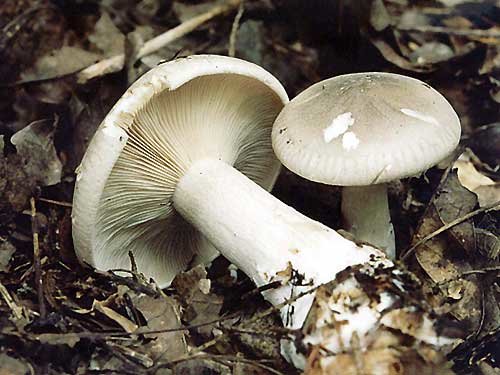Clitocybe nebularis
- Vaega: Basidiomycota (Basidiomycetes)
- Vaevaega: Agaricomycotina (Agaricomycetes)
- Vasega: Agaricomycetes (Agaricomycetes)
- Vasega laiti: Agaricomycetidae (Agaricomycetes)
- Poloaiga: Agaricales (Agaric poʻo Lamellar)
- Aiga: Tricholomataceae (Tricholomovye po'o Ryadovkovye)
- Genus: Clitocybe (Clitocybe poʻo Govorushka)
- ituaiga: Clitocybe nebularis (Clitocybe nebularis)

Tagata tautala asu or smoky rowing (O le t. Clitocybe nebularis) is a fungus of the genus govorushek of the Ryadovkov family.
Ua:
Large, fleshy, 5-15 cm in diameter, at first hemispherical, prostrate with age, sometimes depressed. In youth, the edge of the cap is noticeably tucked up; such a “tuck” is often preserved in a prostrate form, making the appearance of the fungus very characteristic. Color – ashen, sometimes with a yellowish tint; the edges are lighter than the central region. The flesh is thick, white, becoming loose with age. The smell is very characteristic, fruity-floral (very noticeable during cooking).
Faamaumauga:
Initially white, then yellowish, frequent, slightly descending.
Spora pauta:
Uiti.
Vaʻa:
Thick, widening towards the base, often club-shaped, fleshy, full with age, light. Height 4-8 cm, thickness 1-3 cm.
Faʻasalalau:
Smoky talker grows from late summer to late autumn (especially abundant from mid-September to the first decade of October, or even later) in spruce and mixed forests (apparently preferring to form mycorrhiza with spruce), as well as on the edges, in gardens, etc. Often appears in very large groups, forming rings and rows.
Ituaiga tutusa:
Many rows and entoloms look like a smoky talker, which, however, can be unmistakably identified by its characteristic “flowery” smell. If the smell is not so pronounced (which depends on the growing conditions), a distinctive feature of Clitocybe nebularis can be considered a certain “cottoniness” of the pulp in adult mushrooms, which is not characteristic of either rows or entol. Of course, these signs are highly inaccurate, but having met once with a smoky row, it is easy to learn to distinguish it from all other mushrooms without any signs. Intuitively. On the other hand, not knowing the mushroom well, you can confuse it with the clubfoot talker (Clitocybe clavipes). The smell will put everything in its place.
Mea'ai:
Smoky rowing – A good edible mushroom, according to some sources – conditionally edible (in order to avoid misunderstandings, it is better to boil the mushroom, do not use the decoction for food). Surprisingly strongly boiled – perhaps the champion of boiling. Some sources, including Vishnevsky, speak of the poisonousness of this fungus, arguing that this is some kind of heresy (supposedly, “causes shortness of breath and sweating”). I don’t think it should be taken seriously. Another thing is that not everyone likes the peculiar taste and especially the smell of smoky rowing.
Video about the mushroom Govorushka smoky:









